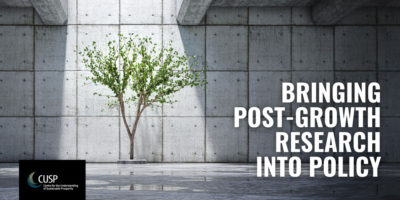How can researchers influence policy when their work lies outside the political mainstream?
The premise of post-growth research is that environmentally sustainable wellbeing should replace GDP growth as the cornerstone of public policy. This interest in a transition beyond the existing parameters of ‘political reality’ means such research faces a significant barrier to influencing policymakers. However, there are both structural and tactical measures post-growth researchers can take to boost the political influence of their work, many of which apply more widely across the social sciences. (This blog first appeared on the LSE Impact Blog.)
Blog by RICHARD McNEILL DOUGLAS

In March 1972, a team of MIT systems analysts produced The Limits to Growth, a report commissioned by a group of environmentally-concerned intellectuals calling themselves the Club of Rome. The conclusions it drew were stark: that if then current economic trends were maintained, then negative feedbacks of growth—in the forms of pollution and the exhaustion of natural resources—would lead inexorably to global economic collapse. Promoting the report to politicians around the world, the Club of Rome expressed the hope that it would lead to ‘significant redirection’ of the global economy within the decade. These hopes were to be disappointed.
Exactly half a century on, the pursuit of indefinite GDP growth may be increasingly questioned, but it is still an article of faith where it matters, in finance ministries around the world. Meanwhile, the unsustainable use of resources has continued apace. In 2021 the latest in a string of studies to revisit the Limits to Growth’s data confirmed that actual trends in resource use and pollution were in line with the report’s original scenarios of forthcoming collapse, generating lurid headlines.
This story highlights an important lesson about the gap that can exist between research and policy. The most compelling research on the most important social issues may still have a hard time being translated into political action, if its premises lie outside an established conception of ‘political reality’.
But there is another story to tell about the Limits to Growth’s influence, and that is the inspiration it has given to generations of researchers in the fields of ecological economics, environmental sociology, and environmental political science—as well as to campaigners in and politicians sympathetic to the green movement. These conditions create the potential for post-growth researchers—treating ‘post-growth’ as an umbrella term, covering equally those who would associate more with ‘degrowth’ or ‘wellbeing economics’—to influence the design of government policy in various ways.
In 2021, the Centre for the Understanding of Sustainable Prosperity (CUSP), directed by Tim Jackson, undertook a project aimed at communicating new research on post-growth economics to politicians at Westminster. Funded by the Laudes Foundation, this project involved economists and political economists at the University of Surrey working closely with politicians and political staff at the All-Party Parliamentary Group (APPG) on Limits to Growth.
A final element of this project was the publication in March 2022 of a ‘meta report’ on the barriers to and opportunities for ‘Bringing post-growth research into policy’. This drew on self-reflections from academics who had worked on this project, the insights of researchers across the CUSP network, and interviews with politicians and political staff. In fact, this equal inclusion of perspectives from academics and political operators was a key feature of the report. The result was the generation both of structural findings that were specific to the post-growth agenda, and tactical recommendations which have relevance to researchers in all fields who seek to work with politicians.
The key structural finding stressed the potential for framing post-growth research around the theme of ‘growth dependency’. This explains the political resistance to the Limits to Growth as reflecting a structural dependency of governments on economic growth, in order to fund public services and maintain social stability. And it frames this as an immediate problem by drawing attention, not only to the environmental unsustainability of ongoing growth, but to the dwindling economic potential for further growth (the ‘secular stagnation’ thesis). Furthermore, it suggests that the very policies that have responded to this slowdown of growth have, by favouring the owners of capital, helped to fuel a populist backlash against political elites.
This framing both highlights postgrowth research as immediately relevant for politicians across the political spectrum, and offers them a tool for asserting a greater sense of control over the public policy environment in which they operate. By identifying growth as both a dependency and one which is fundamentally unsustainable, this critique may be able to frame growth as a dangerous addiction—one that politicians could and should help society to kick. The report draws attention to promising signs of a political receptiveness to these arguments (in countries such as Canada, New Zealand, and Norway), which academics could cite to bolster the political influence of their work.
To focus on the report’s tactical recommendations, a consistent theme was the need for researchers to listen to politicians and their staff regarding the political questions that were preoccupying them—and then to present their work in a form that offered answers to such questions. Another theme was the advantage for researchers of pursuing an influencing strategy that combines both an inside-track (seeking private meetings and ongoing relationships with policymakers in power) and an outside-track approach (applying political pressure by engaging the public in campaigning).
A third tactical theme was the need for researchers to tailor their approach to different kinds of policymaker. Crucially, many politicians are themselves seeking to influence other kinds of policymakers (who are closer to power) to adopt a certain policy—be they ministers in another party, their own party leadership, or even civil servants in their own department. Here there is great potential for politicians and academics to form mutually-beneficial partnerships, since politicians in this situation want to be ‘armed’ with authoritative research to support their case. ‘Policy brokerages’ (such as the Universities Policy Exchange Network, or the Parliamentary Office of Science and Technology) can play an important role in helping such partnerships to form. The politicians interviewed for the report stressed in particular the window of opportunity researchers could exploit when political parties are developing ideas for their next general election manifesto.
Of course, as the self-reflections of this project recognised, in framing research to maximise its influence with politicians there is a danger this can overshadow those aspects of one’s work that are more challenging to the status quo. The lesson suggested here was of the need for researchers to negotiate their own path between the goals of achieving influence and shifting the terms of debate.
(This blog was originally published on the LSE Impact Blog (licensed under CC-BY-NC-ND 3.0)).



